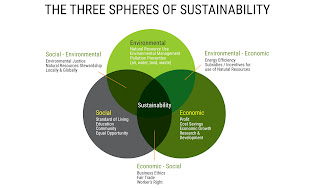SUSTAIN-ABILITY: A STUDY OF THE NEWLY EMPLOYED IN THE PUBLIC SECTORS IN AFRICA, A FOCUS ON NIGERIAN CIVIL SERVICE By David Olumati Nwanguma: In celebration of my one year plus day.
Sustain-ability:
The term sustainability has to do with maintaining
at a consistent rate or level, it is the ability to archive our desires without
compromising the future of the societal needs to reach her goals.
There are manners at which an institution should
operate to instigate a successful sustainable character to better develop an
economy.
There is no way we can separate society from the economy they can actually be different institutions but none can exist without
each other.
The economy cannot be separated from society, it is an integral part of it, but the fact that the economy is just one part of a society has been largely forgotten. The economy and economic thinking should not drive society but rather, support society in its aims.
University Experience:
As a student between 2011 to
2016 there were so much we wished to have been in place or ways our lectures
should have been coordinated by the faculties through the various departments.
We met as undergraduates,
discussed amongst ourselves changes that should be made in the university community at the faculty or departmental levels.
When we discuss
sustainability, the fact that we were trained by very polished lecturers whom
became so proud and comfortable to an extent that they recommended lots of us
to work with them as co lecturers is very comforting and promote a sustainable
growth system.
The only challenge I have
which I strongly believe is a general problem is that idea of letting things
remain exactly the way they’ve always been.
Sometime in 2008 my father
retired from the civil services commission as a lecturer from the Rivers State
College of Health Science and Technology, I remembered visiting offices with
him to sort out his retirement benefits which was another struggle after a long
time of service to the commission. One of the days, we visited the federal
secretariat in the state and we met hundreds of retirees probably in the same
struggle all with an A4 sized paper boldly encrypted ‘GIVE US OUR RIGHTS’ and
some will sing in pain ‘ all we are saying, give us our right’
And in the midst of the crowd
I stood at a corner and asked my Dad: why did you all wait for this long?
Why until now? What did you do in service for almost 30 years? for those years
you were in service, these offices existed right? Why didn’t you all try to make these changes
at that time?
And you know, the few people
left in services at the said office will join hands together to frustrate these
old tired Men and women, keeping them waiting without proper information or
even letting them know whatever the situation might be. What a setting::::
All we are saying, give us our right:
give you what right? You had 25 to 30 years to effect these changes, to
contribute positively to grow the economy into a sustainable standard, but here
you are singing to people who came into office ten to fifteen years after you
joined the commission.
What are we doing when we are
allowed to create changes and impact the economy sustainably?
In recent times there have
been opportunities created from our local to federal government levels and
vibrant innovative individuals have been employed to carry out responsibilities
either on a contract basis or permanently employed by the government some as
office workers and a lot of other teachers in high schools or universities.
It is a time to allow some
changes. I can remember my course mates who have successfully taken up roles at some universities in Nigeria as lecturers: I’ll name a few
Mr. Abiakw Chima
Mr. Erhiegueke Alexander Walsh
Mr. Gerald Maduabuchi Eze
Ms Chinazor okpokwasili
We were all course mates from
the same faculty at the great Nnamdi Azikiwe University. As students, we had
concerns, there were so much we needed to correct, I remembered how we would
all do our very best to coordinate ensembles rehearsals and exams even though I
would only attend the final rehearsals😍, but we all knew our individual
responsibilities and contributions and I’m sure we won’t forget the changes we
wished to have effected so quickly.
There are numerous ideas that
we fail to implement due to fears of godfathers and so-called seniors in the
field.
Getting employed alone bestows on each employee that responsibility, it creates an opportunity to impact, innovate, and enable an environment that allows or instills the ability to sustain a growing economy: what we do with this opportunity is completely up to us.
If we refuse to create an enabling environment for Sustain – Ability, then we have failed continually to activate a sustainable sense of duty which would bring about a failed economy.
Summary
It’s a call to duty, a call to
every innovative mind, a call to remember that the ability to sustain is a
driving force for economic growth, individual development, and stability of the
society. Sustain-ability makes it possible for us to have an effective
transition into an innovative future.
human society should support the environment which it is part of. Economics has not valued natural capital properly, if at all. Natural capital is the natural resources that humans need to meet their fundamental needs; they are things like fresh water, soil, fisheries, forests, air, etc. Since the beginning of the industrial revolution, human economies everywhere have spent our natural capital as if was income. Humanity, particularly the rich industrial part of humanity, has done irreparable damage to the environment removing resources that can never be replaced. (https://www.econation.co.nz/sustainable-economy)







Sustainability is portrayed as a Random ROI. Rather than the application of merit reward theorem characterized as first come first serve syndrome.
ReplyDelete